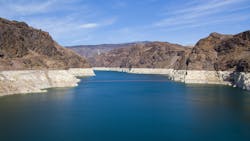Arizona, California, and Nevada have agreed to conserve 3 million acre-feet of Colorado River water in the Lower Basin by the end of 2026, according to a press release by the Department of the Interior.
The agreement is a breakthrough for the Colorado River Basin, which suffered from historic drought, climate change, and unsustainable use by its seven dependent states.
The three states are requesting the proposal be fully analyzed as an action alternative under the Bureau of Reclamation’s draft Supplemental Environmental Impact Statement (SEIS), published last month.
The consensus-based proposal – agreed upon by the three Lower Basin states – commits to measures to conserve at least 3 million-acre-feet (MAF) of system water through the end of 2026, when the current operating guidelines are set to expire. Of those system conservation savings, 2.3 MAF will be compensated through funding from the Inflation Reduction Act, which is supporting efforts to increase near-term water conservation, build long term system efficiency, and prevent the Colorado River System’s reservoirs from falling to critically low elevations that would threaten water deliveries and power production.
Under this consensus proposal, the remaining system conservation needed for sustainable operation will be achieved through voluntary, uncompensated reductions by the Lower Basin states.
“There are 40 million people, seven states, and 30 Tribal Nations who rely on the Colorado River Basin for basic services such as drinking water and electricity. Today’s announcement is a testament to the Biden-Harris administration’s commitment to working with states, Tribes and communities throughout the West to find consensus solutions in the face of climate change and sustained drought,” said Secretary Deb Haaland. “In particular I want to thank Deputy Secretary Tommy Beaudreau and Reclamation Commissioner Camille Calimlim Touton, who have led the discussions with Basin state commissioners, Tribes, irrigators, local communities, and valued stakeholders to reach this critical moment.”
“I commend our partners in the seven Basin states who have demonstrated leadership and unity of purpose in developing this consensus-based approach to achieve the substantial water conservation necessary to sustain the Colorado River System through 2026,” said Deputy Secretary Tommy Beaudreau. “Reclamation’s SEIS process succeeded in facilitating this agreement, and we will carry forward the consensus proposal by analyzing it under the SEIS.”
Following the Lower Basin states’ request, the Department of the Interior announced that it is temporarily withdrawing the draft SEIS published last month so that it can fully analyze the effects of the proposal under the National Environmental Policy Act (NEPA).The Bureau of Reclamation will then publish an updated draft SEIS for public comment with the consensus-based proposal as an action alternative. Accordingly, the original May 30, 2023, deadline for the submission of comments on the draft SEIS is no longer in effect. The Department plans to finalize the SEIS process later this year.
Early next month, the Department plans to formally advance the process for the development of new operating guidelines replacing the 2007 Colorado River Interim Guidelines for Lower Basin Shortages and the Coordinated Operations for Lake Powell and Lake Mead at the end of 2026. In the coming weeks, Reclamation will publish the Notice of Intent for the Environmental Impact Statement related to the post-2026 guidelines.






